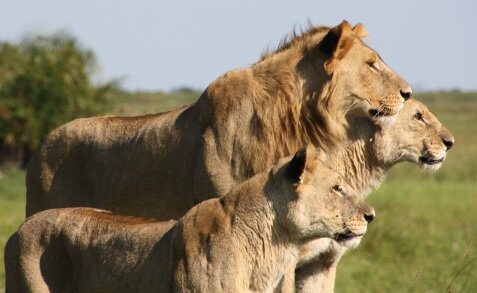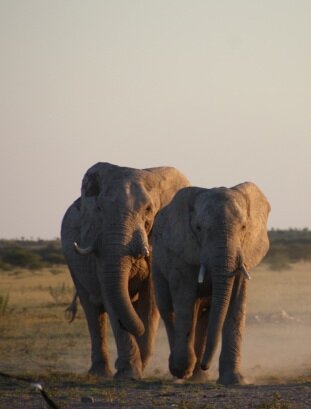Venery? Verily

Bloat of hippos. Tower of giraffes. Dazzle of zebras.
A heap of new terms -- all acquired during my recent trip to Botswana and certainly less familliar than the skulk of foxes or raft of eiders common to our Maine island habitat. Upon returning home, they prompted me to pull from my shelves a book I've not poked around in for years -- James Lipton's The Exaltation of Larks.
A collection of authentic terms used mostly for groups of beasts, fish, fowl or insects, the book's thesis, Lipton writes, is "summed up very simply: when a group of ravens flap by, you should, if you want to refer to their presence, say, 'There goes an unkindness of ravens.' Anything else would be wrong."
Most commonly known as collective nouns, they've also been referred to as nouns of multitude or assemblage -- and, less commonly, as terms of venery. Never mind that venery, along with its adjective venereal, is often associated with, well, let's say, physical love. Harkening back to Middle English and now a largely archaic term, venery is politely defined as "the pursuit of sexual indulgence."
But venery also derives from venari, meaning "to hunt game," signifying the hunt or chase as used in 1320, in the earliest book on English hunting, Le Art de Venery. It's this -- terms of venery -- Lipton uses in Exaltation, though not aspiring to etymology or zoology or any other high order of scholarship other than, he hopes, the "modestly literary."
On full display are the wit and imaginative powers of our language forebears, words that we armchair philologists have had fun with for well over 500 years -- like a business of ferrets, a route of wolves, and the more obvious, though delightful, paddling of ducks. Lipton suggests breaking down the terms into "Six Families," all based on what seems to him like the apparent inspiration for each term. Thus, in the "Characteristic" family, we have a leap of leopards, a peep of chicks. "Habitat" yiels a nest of rabbits and "Appearance" offers a parliament of owls, a knot of toads. The "Comment" family reflects an observer's pro-or-con point of view, such as -- not hard to guess who's foe or fan here -- the richness of martens and the murder of crows.
Of course some terms have slipped out of usage -- a kindle of kittens, anyone? -- and Lipton finds this "lamentable." So, too, that some terms while still a part of our living speech -- like a plague of locusts or a pride of lion -- are so well-used and seemingly mundane that we've forgotten the poetry within them, their original aptness and daring. For Lipton, Exhalation offers a sort of "language sanctuary," a "wild-word refuge" in a time when, he claims, our dwindling language is a precious natural resource in need of protection.

Which brings me to Aesop. Or, rather, to Aesop by way of writer Edward Hoagland. Writing in a recent New York Times piece, "Pity Earth's Creatures," he observes that the ancient fabulist and story-teller believed to have lived 2,500 years ago "nailed down our fellowship with other beasties of the animal kingdom." Since, we've "reached an apogee of separation" as we alarmingly shred our habitat, advance what seems like a "conquest of every other vertebrate on earth." Current tectonic shifts in civilization have never happened this fast before, he warns.
Indeed, having some terms of venery fall out of usage may be "lamentable," but if we were to lose the "beasties" themselves? Clearly, a loss of words that denote the plural is not so hard to imagine if there are a lot fewer creatures around. A herd, for example, isn't needed if we only have Dumbo and not Jumbo, as Hoagland observes. Or, let's say, only Jumbo balancing on a ball in a circus tent and not his ivory-toting brethren traversing the African plains -- and for which a parade, lamentably obsolete, might be more appropriate.

Still, how quick we are, observes Hoagland, given our increasing propensities for separation and destruction, to proclaim we're pigs, sharks, lemmings, sitting ducks, a snake in the grass. We hawk merchandise, ape others, change our spots, weep crocodile tears. We're bearish, catty, chicken-hearted, dogged. We butt in and buzz off. Yes, muses Hoagland, were Aesop to sit among us, he might well "perk his ears, pick up a pen at this very thicket of still current figures of speech." No doubt he'd need more time to recognize that as a species and civilizatioin, we seem intent on claiming every inch of the planet as ours. On the other hand, were Isaac Newton able to sit benath an apple tree today, he may be quick to ask about the orchard,"what have you done with the birds? -- unwittingly evoking Rachel Carson who 50 years ago wrote of a DDT-induced "spring without voices," a premontion of what, with neonicotinoids, a new class of pesticides, we may now be doing to our honey bee populations.
As a species we've long had to accomodate disorienting noise, the seethe of superhighway traffic, cancerous-inducing smoke and pollution, toxicities in our drinking water. And we are familiar with numerous precedents for imperial decline -- but not in our written history, says Hoagland, for the kind of "climate aleration on the scale that's looming or for the gargantuan extinctions in forest and ocean."
As we increasingly worship at the altar of technology and rivet our gaze onto screens, we've become very talented at ignoring warning signs around us: prolonged droughts, floods, tsunamis, ice melts, major temperature swings, and intense heat waves of longer duration. But, from climate change and the rate at which we're already killing things off, is it possible we can escape unscathed? Not that human won't survive. I love how Hoagland likens us to lichen, how we're "hard to dislodge even in extremes from the rocks of our home" so that we'll likely survive if more "willy-nilly in reduced bands."
It's the other species, along with our forests and coral reefs that are largely undefended. Few are their allies within powers-that-be, among folks who probably don't, Thoreau-like, saunter in meadow or wood. Or notice, even if only in their car with the windows down, the presence -- or the more frightening absence -- of a spring chorus of frogs.
And if the truly lamentable happens, if we play a small hand -- or go whole hog -- in creating a world of fewer beasties, what will happen to Aesopian metaphors, Hoagland muses? Whether we're accused of crying wolf or playing possum, whether we let ourselves be buffaloed or keep trying to lead a horse to water, from where will we draw replacement similes and language, as, like deer in the headlights, we stumble into the darkness of a diminished planet?
So let me return to Lipton, to the latter half of Exaltation. Here we find collective nouns for people, many dating to the 15th century, social terms rich in wit and imagination that serve as both portraits of the time -- a safeguard of porters, a drift of fisherman -- and as commentary -- a boast of soldiers, an impudence of peddlers. Terms that, in the 500 years since, have led to a linguistic-free-for-all and spawned, says Lipton, a "game of venery."
Yielding hundreds of terms for people and things -- a flood of plumbers, wince of dentists, block of writers -- it's still being played and added to all the time, often with contemporary twists. An impasse of politicians, anyone? But as engaging as many terms are, I must confess that with Aesop and Hoagland in mind, I'm particularly drawn to a few -- a bark of cynics, an explosion of theorists, an offal of polluters. And, yes, the inevitability of comeuppances.
All photos by the author
